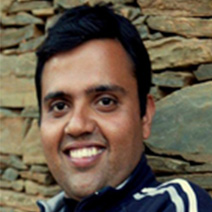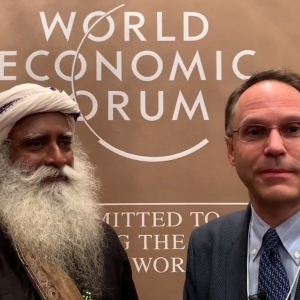Speakers
Swapan Mehra
Swapan Mehra is the Founder and CEO of Iora Ecological Solutions.
J. Carl Ganter
J. Carl Ganter is co-founder and director of Circle of Blue, the center for frontline reporting, research, and analysis on water resource issues and their relationship to food and energy in a changing climate.
A conversation with Swapan Mehra, of Iora Ecological Solutions, around water in India. Swapan explains the value of water and some of the biggest challenges that India faces regarding water.
Transcript
J. Carl Ganter: Hi, I’m J Carl Ganter and we’ve just come out of a session called Ways To Water at the World Economic Forum’s India Economic Summit. And I’m here with Swapan Mehra, and Swapan, what was some of the biggest takeaways out of this session besides having a really engaged audience? I mean, what’s happening with water in India?
Swapan Mehra: It’s really interesting for me to hear in the session was the description of the upcoming Jal Jeevan Mission by the general secretary Ministry of Jal Shakti. So, India has just taken a major initiative in launching a $51 billion mission to ensure that all rural households have tap water collection in five years, and it’s evident that that will require a lot of collaboration, cooperation, and facilitation of data exchange and technology. In the room there were technology enthusiasts who work on metering, who work on pollution controls on, and so forth, and it’s very interesting to note that all of them are hopeful that together we can achieve this dream.
J. Carl Ganter: So besides a panel, we actually turned back to the audience and had them craft all the questions. What were some of the big questions the audience came back to that were either surprising to you, or are questions that everybody’s asking?
Swapan Mehra: One of the common threads of questioning across all of the tables that we distributed the questions to was on resource sustainability. That how are we going to secure the water source for the future if you’re going to distribute it to all our households, and how are we going to make people more accountable in their usage? That was a very interesting thing to note that people are realizing that the government itself cannot be responsible to ensure what is security. So how do we make people pay for water, value water? That was a very interesting thing that was discussed a lot.
J. Carl Ganter: So valuing water takes a lot of money and a lot of investment. You started off by talking about some of the huge dollars in play. What do you see as some of the biggest challenges in meeting these really ambitious, but imperative goals?
Swapan Mehra: One of the big challenges is data for sure. Because, if we have to supply water to so many people, and if we have to ensure that the water source is rejuvenated, we need to be very, very clear on what resources are available, at what time, and where. So we need to analyze water budgets, we need to be able to foretell emergencies, we need to be able to analyze the the recharge rates are happening on time, so on and so forth. So one big challenge is data. Not only did availability, but also data sharing. So that’s one major issue.
The second major issue is technology and innovation. We heard in the session that we need to make sure that we treat much more of our waste water. Right now our efficiency is very low. We treat only 15% to 20% of all waste water. We need to increase that to 80% to 90% in order to fulfill the requirements that we have in our country.
And then finally, the third thing is going to be finance. Where do we get all this finance from if you have to manage all of these local sources? one is public financing from budgets, but we’ll have to go beyond, and explore alternative sources like payment for water credits, maybe water bonds, so on and so forth. That’ll required to be done for sure.
J. Carl Ganter: So what’s the most exciting thing that will have happened, say in five years when we’re back, or maybe year when we’re back here again? Next year or five years from now, what’s the most exciting thing that will have happened?
Swapan Mehra: I think one of the most exciting things that will happen will be the roll-out of the Jal Jeevan Mission. Imagine that we are going to roll out to 180 million families that water connections. Imagine that opportunity that it presents in terms of being a sandbox, in terms of being a pilot test case, in terms of being the incubation for new technologies and financial opportunities. That’s really exciting.
The second major thing is going to be this work that I’m involved in, which I’m really excited about, is creating this sort of one data water bottle consortium in which we bring together a lot of remotely sense data, but also source data from the ground using forces of citizens and students in order to contribute to this idea of communicating the water balance to each citizen, and each decision maker.
J. Carl Ganter: Okay, so on the other side of that, what’s the biggest challenge? What’s the biggest roadblock to achieving all these goals in the next five years?
Swapan Mehra: I think one of the biggest challenges is fostering collaboration, international and national, amongst various providers of information, various investors. I see that the environment now is very enabling to do that, but that still needs to be done, for sure. The second is to be able to test out technologies and then deploy them at scale in a very rapid pace because that’ll lead to be done. Speed is going to be really, really critical.
And then the third thing is the scale itself. At the end of the day, it deploying potable water, 280 million families, while ensuring that the groundwater is recharged at the right pace is a scale challenge, but an opportunity for the whole world to come and test out what they can do.
J. Carl Ganter: Wow. Well, hopefully it will be back here next year and we’ll see how we’re doing in five years from now, and see what we’ve all accomplished because these existential forces of climate change and these other big issues, and the fourth industrial revolution provides a really exciting path forward for navigating that challenge. So, thanks so much for being part of the panel today, and for your really great comments afterwards.
Swapan Mehra: Thank you so much, Carl. It was great meeting you.
J. Carl Ganter is co-founder and managing director of Circle of Blue. He is a journalist and photojournalist, recipient of the Rockefeller Foundation Centennial Innovation Award, and an Explorers Club Fellow.






